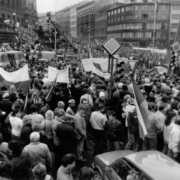Exactly 30 years ago, on November 27th, 1989, the work in Czechoslovakia stopped for two hours. Between 12 pm and 2 pm, offices, businesses, and factories began a general strike throughout the country. Where they could not interrupt operations, they expressed at least manifestly solidarity by wearing the tricolor national colours on their clothes. The strike was attended by 75 percent of the citizens.
“My name is Josef Judas, and I am from a youth team. I want to tell the whole country that Ostrava’s mining and steel are with the nation,” said on November 27th, 1989. That day, not only the miners in Ostrava protested. Afternoon the strikers filled squares all over the country.
“Wenceslas Square, at ten past twelve. It’s hard to guess how many people congregated today. Even at this time, more crowds are flowing here, and the adjoining streets are filled. There is a human river from the statue of St. Wenceslas. Everyone came to support the basic demands of students and the Civic Forum,” said Jany Havligerové and Stanislava Bendy on November 27th, 1989, reporting for Czechoslovak Radios.
There were 300 thousand protesters on Wenceslas Square. “I’ve been looking forward to what’s happening here all my life,” said Miloš Pařez, a worker and one of the protesters who came to Prague with his colleagues from Kolín.
The strike had two main slogans: “End of One-Party Government” and “Free Elections”. This was the first time making a public demand for the abolition of the leading role of the Communist Party. At the same time, the protesters demanded an investigation into the recent crackdown on people at Narodni Avenue.
The strike was massive. There was no metro in Prague, and the shops were closed, including convenience stores on Michelská Street.
“We had a meeting, and most of the staff said they were going on strike, so they wanted to close at 12 o’clock,” said the boss of a convenience store.
At that time, State Security was still working and since the morning tried to reverse public opinion and discredit the leaders of the Civic Forum.
“Cars were distributing misinformation leaflets around Prague and such brief information about who Vaclav Havel was, with all lies. The state security was still working at full speed and had the task of discrediting the Civic Forum,” said historian Jiří Suk.
However, the general strike was a success. That evening, radio news listeners heard that they would be able to borrow books that were banned until then.
“The Czech Ministry of Culture has announced that the Minister’s decision immediately releases the literature that has not been accessible to the public in the collections of the libraries,” was said precisely thirty years ago.
Two days later, the Federal Assembly approved an amendment to the Constitution. The Communist Party’s leading role was abolished, and Marxism-Leninism officially ceased to be a state ideology. A new government was set up on December 10th to prepare the first free elections, that happened in June 1990.

Olomouc, 27.11.1989. Photo: Vladislav Galgonek

Wenceslas Square. Photo: Archiv Mr. Růžičky

Ostrava. Photo: Pavel Danel
Support Prague Morning!
We are proud to provide our readers from around the world with independent, and unbiased news for free.
Our dedicated team supports the local community, foreign residents and visitors of all nationalities through our website, social media and newsletter.
We appreciate that not everyone can afford to pay for our services but if you are able to, we ask you to support Prague Morning by making a contribution – no matter how small 🙂 .




